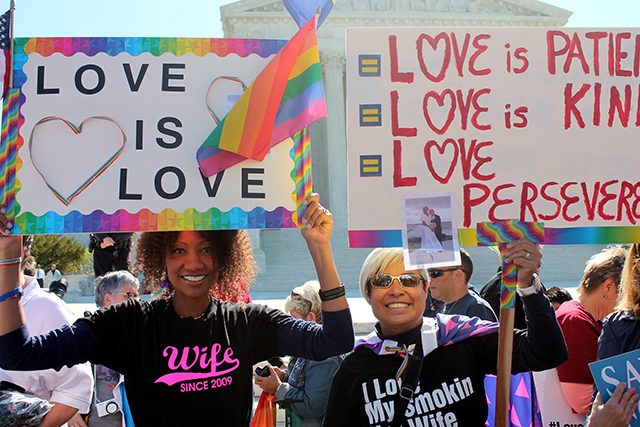In Marriage Decision, An Ode to Love and Four Provocations
http://religiondispatches.org/in-marriage-decision-an-ode-to-love-and-four-provocations/
BY SARAH POSNER JUNE 26, 2015

Image from DC protest in April of 2015 courtesy flickr user Elvert Barnes via Creative Commons
Today’s majority opinion in Obergefell v. Hodges, striking down state bans on same-sex marriage, is an ode to love—and the law. Authored by Justice Anthony Kennedy, who was joined by the Court’s four liberal justices, it’s also an homage to the Constitution’s guarantees of equal protection, an affirmation of the role of the Court in interpreting the Constitution, and an exposition on the nature of tolerance and acceptance, including religious tolerance, in a democratic society.
The right to marry, the Court held today, “is a fundamental right inherent in the liberty of the person, and under the Due Process and Equal Protection Clauses of the Fourteenth Amendment couples of the same-sex may not be deprived of that right and that liberty.”
At its core, the majority opinion celebrates the special bonds and intimacy between couples, whether gay or straight, whether interested in children or not, and affirms that all couples have equal rights to participate in marriage. While the four conservative dissenters rejected the concept that the Constitution, or the Court, or even any branch of the government should protect the equality and therefore dignity of its citizens, the majority opinion hinges on the Court’s precedents in doing exactly that. It draws on a series of cases reaching back to Griswold v. Connecticut, which in 1965 struck down laws criminalizing the sale and purchase of contraception, Loving v. Virginia, which in 1967 struck down laws barring marriages between couples of different races, and, of course, Lawrence v. Texas, which in 2003 struck down anti-sodomy laws, and United States v. Windsor, which invalidated the Defense of Marriage Act ten years later.
Kennedy answered conservative claims that marriage equality would undermine the institution of marriage, arguing that “far from seeking to devalue marriage, the petitioners seek it for themselves because of their respect—and need—for its privileges and responsibilities. And their immutable nature dictates that same-sex marriage is their only real path to this profound commitment.” Preempting claims that same-sex couples have attained many rights in recent decades, and they shouldn’t then undermine the historic institution of marriage, Kennedy argued that Lawrence, for example, provides insufficient protection under the Constitution because going from “outlaw to outcast may be a step forward, but it does not achieve the full promise of liberty.” The Constitutional guarantee of equal protection, the majority wrote, ensures that both same-sex and opposite-sex couples equally “may aspire to the transcendent purposes of marriage and seek fulfillment in its highest meaning.”
more at link
